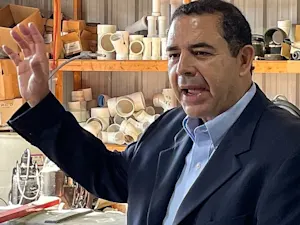
Dr. Oz Prescription for Medicare and Medicaid
Using a hearing in the Consumer Protection panel that Claire McCaskill leads to pose tough questions to popular TV host Dr. Mehmet Oz on his frequent claims about "miracle" products. Photo by Office of United States Senator Claire McCaskill. Public domain.
Dr. Mehmet Oz, the celebrity medical guru turned Republican Senate candidate, is poised to become one of the most powerful figures in American health care.
After a tight party-line vote in the Senate Finance Committee, his nomination to lead the Centers for Medicare & Medicaid Services (CMS) is heading to the full Senate. His confirmation or rejection could reshape the daily healthcare reality for over 160 million Americans, especially seniors and low-income patients.
Oz's arrival at the helm of the $1.5 trillion agency is sparking serious questions, not just about his celebrity past but also about what he plans to do with Medicare, Medicaid, and the nation's growing reliance on privatized care.
Not in Columbia Anymore
Oz isn't new to medicine; he built his reputation at Columbia University as a top-tier heart surgeon. Then he became the host of "The Dr. Oz Show," which brought him to even greater national prominence but not without his share of controversy. After repeated promotions of unproven weight-loss supplements like green coffee bean extract and raspberry ketones, Oz faced a grilling from a Senate subcommittee in 2014 for false advertising, as well as class action lawsuits and public rebukes from the medical community.
Despite the controversy, Oz remained popular and transitioned into politics, running a 2022 Senate campaign in Pennsylvania; he only narrowly lost to John Fetterman.
Now Oz is facing the Senate again, but this time to earn their confirmation for one of the country's most prominent public health jobs.
Who Is the Man in Front of the Curtain?
Dr. Oz spoke openly about protecting CMS in his opening statement at his Senate Finance Committee Hearing. "I commit to doing whatever I can, working tirelessly to ensure that CMS provides Americans with access to superb care, especially Americans who are most vulnerable: our young, our disabled, and our elderly," he said, according to NPR.
Responding to a question from Senator Todd Young (R-Indiana), Oz shared his belief on the need to promote healthy lifestyles, saying, "For anyone in this committee who was able to go running or exercising for 20 minutes yesterday, you probably did the equivalent of reducing $100 billion of expenses for Medicare and Medicaid just by being active — if Americans would do that every day, that's what we'd experience," as reported by NPR.
"I think it is our patriotic duty to be healthy," he also said.
That statement resonated with many of the Senators on the subcommittee. Senator Roger Marshall (R-Kansas) defended Oz's nomination, saying, "Republicans are here to save Medicaid."
However, not everyone was convinced.
Critics and Skeptics and Questions — Oh My!
Democratic Senators questioned Oz about his previous brush with alleged false advertising and his position on current and potentially upcoming budget cuts from CMS.
House Republicans are pushing for $880 billion in budget cuts from CMS, much of which would likely fall on Medicaid — the program that helps more than 70 million low-income Americans access care. If Oz is confirmed, he'll be in charge of managing physician payments and determining how the agency balances its books; critics are unsure how Oz would defend front-line providers if those cuts pass.
Additionally, Democratic Senators took issue with Oz's advocacy of Medicare Advantage — the privatized alternative to traditional Medicare. More than half of seniors now use these plans, which are offered by insurance companies like UnitedHealth. Oz co-authored a 2020 op-ed pitching "Medicare Advantage for All" as a national health solution and pushed for an expansion of the program. His past financial disclosures revealed up to $600,000 in UnitedHealth Group stock holdings, though he has promised to divest.
Critics of Medicare Advantage argue that the program creates barriers to care with prior authorizations, limits provider choices, and costs taxpayers more. According to NPR, when asked about the potential for CMS cuts, Oz answered, "I cherish Medicaid."
When questioned, Oz acknowledged Medicare Advantage's flaws but argued that those issues could be fixed. "We're actually apparently paying more for Medicare Advantage than we're paying for regular Medicare — so it's upside down," he said, as reported by NPR.
Skeptics were not moved by Oz's replies. "Given Dr. Oz's history of basically acting as a salesman for Medicare Advantage, putting him in charge of regulating these middlemen is almost like letting the fox guard the proverbial henhouse," said Senator Ron Wyden (D-Oregon), as reported by NPR.
Senator Tina Smith (D-Minnesota), according to NPR, replied even more harshly, saying, "I'm voting no because of what I see as a concerted effort by the Trump administration and some congressional Republicans to use Medicaid as an ATM to pay for tax breaks for the biggest, most successful corporations and wealthy individuals."
What's Down the Yellow Brick Road?
Oz now faces a full vote in the Senate, where insiders say he will likely be confirmed. Oz would then work with HHS Secretary Robert F. Kennedy Junior on transforming American healthcare for the foreseeable future. Whether that transformation is wizardly or witch-like remains to be seen.
References:5 things to know as Dr. Oz gets one step closer to leading Medicare and Medicaid | Why many Republicans think shrinking Medicaid will make it better | Medicare pay cuts: How they endanger physician practices | Will Dr. Oz Push Medicare Advantage Plans if Confirmed? | Dr. Mehmet Oz, Trump's pick to lead Medicare and Medicaid, gets his Senate hearing | From TV to CMS: How Dr. Oz could shape Medicare and Medicaid






















